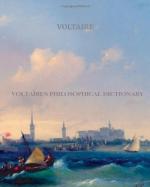|
This section contains 9,458 words (approx. 32 pages at 300 words per page) |

|
SOURCE: Knapp, Bettina L. “An Innovative Theatre Traditionalist.” In Voltaire Revisited, pp. 80-102. New York: Twayne Publishers, 2000.
In this excerpt, Knapp gives an overview of Voltaire's theatrical career, focusing on his influences and his tragedies. Knapp notes that Voltaire was predominantly influenced by the French classical tradition of Corneille and Racine, but was also taken with the very unclassical freedom of Shakespeare. Knapp suggests that Voltaire was conflicted about the form and formality of the drama, leading to works that sometimes manifested his confusion. His works also reveal the antidogmatic and antiestablishment themes of his Englightenment philosophy.
From the outset of his career as playwright (Oedipus, 1718), to his last stage piece (Irene, 1778), Voltaire was considered one of the finest dramatists of his era. Although his talents did not measure up to the genius of Corneille or Racine, the thrust, style, multiplicity of thematics, and, paradoxically, the innovations that...
|
This section contains 9,458 words (approx. 32 pages at 300 words per page) |

|


